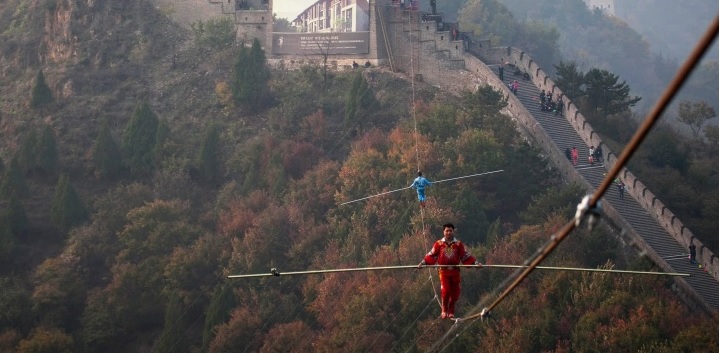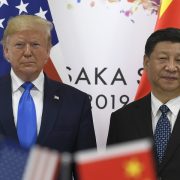
China’s present troubles with the US might be rooted in a misperception of what should have been done in the past.
What did China do when America struggled in Iraq and Afghanistan in 2004-2005? Rather than helping it in these difficulties, Beijing kept aloof politically and slowed down the economic and political reforms it had started. This path was played up after the 2008 financial crisis.
That year, China began a gradual rapprochement with Russia, which had attacked Georgia without substantial US response. America’s financial and political difficulties and Russia’s growing unchecked aggression shifted Chinese attention toward Moscow—especially after 2014, when the Russian annexation of Ukrainian Crimea garnered little Western reaction.
Then, in Beijing the prevailing view was that the US was declining and Russia was coming out on top. Bookshops were filled with volumes singing praises of Russian President Vladimir Putin as a true global leader. Beijing sided against the incumbent power in favor of the rising one, as if thinking that Russia would almost act as an icebreaker for Beijing’s own rise.
The US had taken a different path in 1917, at the time of its entry into World War I. Then, the US, instead of supporting the emerging power, Germany, backed the incumbent one, Britain.
The US had benefited from the existing political order dominated by Great Britain. The US had been the world’s leading economic and industrial power since 1870, almost 50 years before it entered the conflict. In other words, in the face of German aggression, the US supported the old order and thus essentially replaced the existing power, Great Britain.
Between 2008 and 2014, in the face of new Russian aggression, China did not choose to support the existing order, which had made its growth and development possible, but got close to Russia in challenging the current political order, although China was not yet the leading economic power.
This situation seems to have taken a step forward in recent days. Russian and Chinese media announced they will work together to get a louder voice worldwide.
China’s Global Times interviewed Margarita Simonyan, editor-in-chief of the Russian TV network RT, who declared: “We have known for years that these audiences have long stopped believing the narratives sold to them by their mainstream media—which is why they have tuned in to RT in the first place, years ago—because we showed their reality better than their channels. These audiences are now finding every way possible to continue to access RT on TV, online, and on social media in the territories where RT has been banned.”[1]
Furthermore, the Global Times also averred that “the US-led West’s defamation of China-Russia cooperation is a deliberate tactic in their public opinion warfare, and China and Russia are the genuine defenders of the world order, which is rooted in international law.” It quoted the Russian President Vladimir Putin as saying, “The Russian President also described the West’s global influence as an ‘immense military and financial pyramid scheme,’ which constantly needs more ‘fuel’ to support itself, with natural, technological, and human resources that belong to others… To attain these goals, they [the West] try to replace international law with a ‘rules-based order.’”[2]
The articles come just a few days after the US published a massive report blasting China for seeking to reshape the global information environment.[3]
Will the possible new Russia-China entente against the “US-led West’s defamation warfare” impact the war in Ukraine? Will it help Moscow’s war efforts? Could it affect the course of the fighting?
Russian misgivings about Chinese advances in Central Asia have apparently subsided in the past few months. Moscow was irked by Beijing’s summit of Central Asian republics (Russia’s traditional area of influence) in mid-May. China may now think that a Russian utter defeat in Ukraine is unlikely, and thus, it is even more unlikely that a collapse of Russia like that of the former USSR would leave Central and East Asia up for grabs.
But closer Chinese cooperation with Russia on the sensitive field of “information warfare” might have repercussions for China’s vital trade surplus with the US and other G7 countries, which hit a whopping $1 trillion record.
Besides, do the two countries have the same agendas? Doesn’t it create a conflict of policies, or is this a signal of a more significant intent? Fundamentally, is the idea of using Russia to counter the US really viable?
In any case, China is not totally on Russia’s side, and it’s clear that China and Russia are very agile and proactive vis-a-vis Western initiatives. Things could spin in many directions in the future and Beijing may want to keep its options open.
Still Beijing could be pushed to take sides once again.
On October 7, Iran-sponsored Hamas launched a massive attack from Gaza on Israel. The apparent goal is also to undermine the ongoing US-backed normalization between Israel and Saudi Arabia. In March, China brokered a groundbreaking pact between Iran and Saudi Arabia, and the US felt stung by being excluded from it. The Saudi deal with Israel could put the Saudi-Iran agreement on the back burner and rebalance the game in the Middle East. China has recently also warmed up to the Palestinian cause, after years of good ties with Israel.
Because of the gravity of the Hamas attack, the Israeli counterattack could be even harsher. It could create controversies in the Arab world, and it could distract the world’s attention from Ukraine when the fighting is in a lull. The West is growing tired of the war, but a Russian counterattack, supported by other countries, might still be possible.
In this situation, China should be careful in moving forward; mistakes could cost it dearly.
[1] https://www.globaltimes.cn/page/202310/1299309.shtml
[2] https://www.globaltimes.cn/page/202310/1299309.shtml
[3] https://www.state.gov/gec-special-report-how-the-peoples-republic-of-china-seeks-to-reshape-the-global-information-environment/





